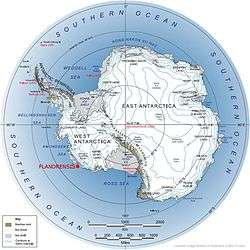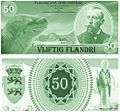Grand Duchy of Flandrensis
The Grand Duchy of Flandrensis (Dutch: Groothertogdom Flandrensis) is a micronation with claims over some territories of Antarctica, which was founded in 2008 by the Belgian Niels Vermeersch. Flandrensis is not recognised by any country or government,[5][6][7][8] nor is it their intention to be recognized as a country.[9]
Grand Duchy of Flandrensis | |
|---|---|
 Flag
 Coat of arms
| |
Motto: Flandrensis Domi Nostrae | |
Anthem: "Long Live Flandrensis" | |
 | |
| Status | Current |
| Official languages | Dutch, English |
| Demonym(s) | Flandriaan, Flandrensian |
| Organizational structure | Constitutional monarchy |
• Head of State | Niels Vermeersch |
• Head of Government | Joaquín Castillo-López |
| Establishment | |
• Declared | 4 September 2008 |
| Area claimed | |
• Total | 14,890 km2 (5,750 sq mi) |
| Population | |
• Census | 500 (2019)[1] |
| Purported currency | Flandri[2][3][4] |
| Time zone | GMT-8 |
History
The Grand Duchy of Flandrensis was founded on September 4, 2008.[10] The Micronation is inspired by the medieval County of Flanders (Pagus Flandrensis).[5][6] Flandrensis was firstly regarded by the founder as a hobby-micronation, later as an ecological venture, to raise awareness on ice melting and climate change.[11][12] The micronation has its own identity cards, currency, newspaper, constitution and national anthem. Flandrensis is also a political simulation[4] with political parties like the APPF (pirate party), DRP (royalist), NPF (nationalist), FDUP (unionist), FL-AL (solidarity), Lijst Govaert (liberal)[4] and L&S (republican)[13] and organises yearly elections.[4] Professor Alastair Bonnett of the University of Newcastle described Flandrensis as an example of a micronation that is inspired by a city council in which young people learn to make decisions.[14] The founder also described Flandrensis as a cultural organisation.[4][15] In 2012 the micronation is composed of 128 citizens from 28 different nationalities[15] Outside the internet the activities of Flandrensis are restricted to the region around Roeselare[5][6] but the official embassy is located in the West-Flemish town Langemark.[4][16][17] Flandrensis has also a Commonwealth that unites only Dutch-speaking micronations: the Grand Duchy of Flandrensis, the Principality of Arkel and the Duchy of Campinia.[4] Flandrensis has been mentioned in Belgian regional media like the Krant van West-Vlaanderen[4][18] and Roeselare TV.[19] After the participation of Flandrensis in Polination 2012 (2nd International Conference on Micronations on July 14, 2012 at London)[20] the micronation came to the attention when the Belgian newspapers Het Nieuwsblad,[5] Het Belang van Limburg[2] and Gazet van Antwerpen[3] published an article about Flandrensis as part of a reportage on European micronations. Flandrensis was later present on other international conferences on micronations in Perugia (2015), Aigues-Mortes (2016), Atlanta (2017) and Vincennes (2018).[9][21][22][23] Flandrensis is one of the few micronations whose coverage of the elections were published by local media.[13] In 2014 the micronation was the theme of the television show "Normale Mensen" on the Belgian channel Één.[24]
Territory
Flandrensis is regarded by the founder as an ecological venture, to raise awareness on ice melting.[9][11] Flandrensis has no intentions to visit their claims.[4][5][6][15] The territorial claims of Flandrensis are a statement to the international community and they claim that the micronation is the only country in the world that doesn't want any people on its territory.[9] On the basis of an interpretation of the Antarctic Treaty (1959), Flandrensis claims five islands off the coasts of West Antarctica: Siple Island, Cherry Island, Maher Island, Pranke Island and Carney Island.[25] Niels Vermeersch sent letters to the United Nations, the European Union and to the nations who signed the Antarctic Treaty to inform them of his claim. All of these countries ignored Niels and his claim. Because of the claims, a diplomatic conflict with the micronation Westarctica arose in 2010, this resulted in the creation of the Antarctic Micronational Union (AMU).[2][3][4][7] Coverage of this conflict[26] appeared in the Dutch Columbus magazine,[27] the Croatian newssite Telegram[28] and the French book Les Micronations.[29] In 2010 the on-line Russian newspaper Chastny Korrespondent (Private Correspondent) published an article about Antarctic micronations and described Flandrensis as one of the most "resonant" micronations on Antarctica.[4][30]
National symbols
The flag of Flandrensis is inspired by the first Belgian flag of 1830. The original Belgian flag's yellow band has been replaced by white which symbolises a new beginning. For the same reason there are also two lions on the coat of arms, based on the Flemish lion.[2][3][4][17]
Micronational nobility
In 2015 the Belgian author Julien Oeuillet published the book "Le business des vanités: enquête sur les arnaques à la noblesse" about the subject of fake nobility and scams. The book mentions several micronations like Hutt River, Araucanía and Patagonia and Flandrensis. The author described the micronation Flandrensis as an alternative and humoristic way to get a title of nobility, but that nobility in the micronation only exists because of the medieval character of the micronation and not from ambition to create titles. Neither the founder nor the “citizens” use them outside the community of micronations. Although those titles are considered real and legal, because those are not Belgian noble titles, but the Flandrensisian ones. The micronation does not sell any noble titles.[10]
Photos of Flandrensis published in media

- Niels Vermeersch with Kevin Baugh of the Republic of Molossia on 15 July 2012 at the Polination Micronational Conference in London.[5][6][15]

See also
- List of micronations
- Flags of micronations
- List of Antarctic territorial claims
References
- BEANLAND , C., King of your castle, Open Skies, Emirates Printing Press, 01 May 2019, page 49-50
- (in Dutch) DAMIAANS, R., DILLEN, R., Uw krant op bezoek bij Europese micronaties Deel 1: Flandrensis, Het Belang van Limburg, 20 July 2012, page 20-21
- (in Dutch) DAMIAANS, R., DILLEN, R., Dwergstaten Deel 1: Flandrensis, Gazet van Antwerpen, 23 July 2012, page 8-9
- (in Dutch) GHEERAERT, T., Diplomatieke rel om een deel van Antarctica, Het Wekelijks Nieuws, 05 September 2013, page 10-11
- (in Dutch) VANSTEENKISTE, A., “Hoogledenaar is Groothertog van micronatie Flandrensis, Het Nieuwsblad, 13 September 2012, page 22-22
- (in Dutch) VERHAEGHE, H., Middagpost West-Vlaanderen Archived 2012-12-03 at the Wayback Machine, Radio 2, 13 September 2012 (interview with Niels Vermeersch)
- (in French) BELENFANT, M., Sa Majesté le Grand-Duc de Flandrensis brise la glace, 'Le Jeu de l'Oie: La Revue Internationale de Sciences – Po Lille', April 2014, page 30-31
- The Telegraph, Ten bizarre micronations, 14 May 2014
- The Brussels Times, Springtime of micronations spearheaded by Belgian "Grand-Duke" Niels, 8 December 2015
- (in French) Oeuillet, J., Le business des vanités : enquête sur les arnaques à la noblesse", Ed. du Moment, 16 April 2015, pages 207, ISBN 978-2-35417-370-8
- (in Dutch) STROCHLIC, N., Ieder zijn eigen koninkrijk, National Geographic, April 2016, page 8-9
- (in Polish) BARTKIEWICZ, A., Jak zostać królem, RZECZPOSPOLITA (Minus Plus), 20 July 2017, page 10-12
- (in Dutch) GHEERAERT, T., Verkiezingen in Flandrensis, Het Wekelijks Nieuws, 17 October 2014, page 62
- (in Russian) APPARAT, 5 steps to create your own micronations Archived 2015-01-22 at the Wayback Machine, December 2014
- (in French) PRUDENT, R., Envie d’être chef ? Toi aussi, crée ta micronation en dix leçons , ‘Rue 89', 12 June 2014
- (in French) MAZARS, P., “Micronations: la tournée du grand-duc, ‘Le Journal du Dimanche', 28 July 2014
- (in Dutch) CORNILLIE, B., “Niels, groothertog van Flandrensis, Het Laatste Nieuws, 29 August 2014, page 20
- (in Dutch) DUBOIS, T,. Reportage plus: Niels Vermeersch staat als groothertog aan het hoofd van zijn eigen micronatie Flandrensis, 15 June 2012, page 10-11
- (in Dutch) DEJONCKHEERE, A., Kleurrijk Roeselare: Roeselarenaar Groothertog, video, Roeselare TV, 2011
- PoliNation 2012: 2nd International Conference on Micronations Archived 2013-01-28 at Archive.today
- THE TELEGRAPH, T. Coote, , Inside the weird world of the micronation, 14 July 2015
- (in French) BONZOM, N., « Le sommet francophone des micronations, entre folkore et engagement citoyen », 20 minutes, 26 September 2016,
- (in French) PLACER, A., Sommet de micronations sur le pavé: folklorique et citoyen, La Voix du Nord, 21 January 2018
- (in Dutch) Alaska TV., "Normale Mensen", video, Één, 23 September 2014
- USA Today, E. Lyman, New micronation faces birthing pains, 20 May 2015
- (in Russian) THE VILLAGE, Federalization of the planet: what with the old world?, 24 October 2014
- (in Dutch) COLUMBUS MAGAZINE, Het Groothertogdom Westarctica Archived 2015-09-23 at the Wayback Machine, 22 June 2010
- (in Croatian) TELEGRAM, Države za koje niste čuli i koje nitko ne priznaje (a jedna nam je susjed), 2015
- (in French) Delafontaine, L., Les Micronations, Montreuil-sur-Brêche, Diaphane, 14 September 2013, pages 160, ISBN 978-2-919077-19-9
- Manchits, Roman (2010-08-28). Родезийская война в Антарктиде [Rhodesian War in Antarctica]. ChasKor (in Russian). Retrieved 2015-10-05.
Ещё одно из наиболее резонансных микрогосударств в Антарктиде — Великое Княжество Фландренсис.